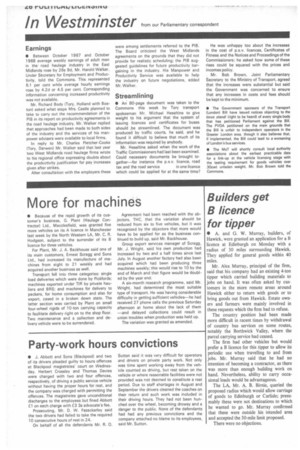In Westmin.ster from our Parliamentary correspondent Earnings
Page 28

If you've noticed an error in this article please click here to report it so we can fix it.
• Between October 1967 and October 1968 average weekly earnings of adult men in the road haulage industry in the East Midlands rose by 26s 9d, Mr. Harold Walker, Under Secretary for Employment and Productivity, told the Commons. This represented 6.1 per cent while average hourly earnings rose by 4.2d or 4.5 per cent. Corresponding information concerning increased productivity was not available.
Mr. Richard Body (Tory, Holland with Boston) asked what steps Mrs. Castle planned to take to carry out the recommendation of the PIB in its report on productivity agreements in the road haulage industry. Mr. Walker replied that approaches had been made to both sides of the industry and the services of his manpower advisers were available to local firms.
In reply to Mr. Charles Fletcher-Cooke (Tory, Darwen) Mr. Walker said that last year two West Midlands road haulage firms wrote to his regional office expressing doubts about the productivity justification for pay increases given after strikes.
After consultation with the employers these were among settlements referred to the PIB. The Board criticized the West Midlands agreements on the grounds that they did not provide for realistic scheduling; the PIB suggested guidelines for future productivity bargaining in the industry. His Manpower and Productivity Service was available to help the industry on future negotiations, added Mr. Walker.
Streamlining
• An 80-page document was taken to the Commons this week by Tory transport spokesman Mr. Michael Heseltine to give weight to his argument that the system of issuing licences and certificates for buses should ,be streamlined. The document was produced by traffic courts, he said, and he found it difficult to believe that much of its information was required by anybody.
Mr. Heseltine asked when the work of the Traffic Commissioners had last been examined. Could necessary documents be brought together—for instance the p.s.v. licence, road tax and the road service in one licence which could be applied for at the same time? He was unhappy too about the increases in the cost of p.s.v. licences, Certificates of Fitness and the Notices and Proceedings of the Commissioners; he asked how some of these rises could be squared with the prices and incomes policy.
Mr. Bob Brown, Joint Parliamentary Secretary to the Ministry of Transport, agreed that the increases were substantial but said the Government was concerned to ensure that any increases in costs and fees should be kept to the minimum.
• The Government sponsors of the Transport (London) Bill have issued notices objecting to the locus standi (right to be heard) of every single body that has petitioned Parliament against the Bill. The PVOA petitioned on the main grounds that the Bill is unfair to independent operators in the Greater London area, though it also believes that. if implemented. the Bill could lead to a worsening of London's bus services.
• The MoT will shortly consult local authority associations about the earliest practicable date for a link-up at the vehicle licensing stage with the testing requirement for goods vehicles over 30cwt unladen weight. Mr. Bob Brown told the Commons.








































































































